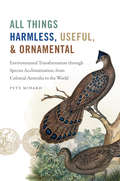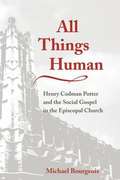- Table View
- List View
All Things Cease to Appear
by Elizabeth BrundageA dark, riveting, beautifully written book--by "a brilliant novelist," according to Richard Bausch--that combines noir and the gothic in a story about two families entwined in their own unhappiness, with, at its heart, a gruesome and unsolved murder Late one winter afternoon in upstate New York, George Clare comes home to find his wife killed and their three-year-old daughter alone--for how many hours?--in her room across the hall. He had recently, begrudgingly, taken a position at a nearby private college (far too expensive for local kids to attend) teaching art history, and moved his family into a tight-knit, impoverished town that has lately been discovered by wealthy outsiders in search of a rural idyll. George is of course the immediate suspect--the question of his guilt echoing in a story shot through with secrets both personal and professional. While his parents rescue him from suspicion, a persistent cop is stymied at every turn in proving Clare a heartless murderer. And three teenage brothers (orphaned by tragic circumstances) find themselves entangled in this mystery, not least because the Clares had moved into their childhood home, a once-thriving dairy farm. The pall of death is ongoing, and relentless; behind one crime there are others, and more than twenty years will pass before a hard kind of justice is finally served. A rich and complex portrait of a psychopath and a marriage, this is also an astute study of the various taints that can scar very different families, and even an entire community. Elizabeth Brundage is an essential talent who has given us a true modern classic.From the Hardcover edition.
All Things Cease to Appear: A novel
by Elizabeth BrundageA dark, riveting, beautifully written book—by “a brilliant novelist,” according to Richard Bausch—that combines noir and the gothic in a story about two families entwined in their own unhappiness, with, at its heart, a gruesome and unsolved murder Late one winter afternoon in upstate New York, George Clare comes home to find his wife killed and their three-year-old daughter alone—for how many hours?—in her room across the hall. He had recently, begrudgingly, taken a position at a nearby private college (far too expensive for local kids to attend) teaching art history, and moved his family into a tight-knit, impoverished town that has lately been discovered by wealthy outsiders in search of a rural idyll. George is of course the immediate suspect—the question of his guilt echoing in a story shot through with secrets both personal and professional. While his parents rescue him from suspicion, a persistent cop is stymied at every turn in proving Clare a heartless murderer. And three teenage brothers (orphaned by tragic circumstances) find themselves entangled in this mystery, not least because the Clares had moved into their childhood home, a once-thriving dairy farm. The pall of death is ongoing, and relentless; behind one crime there are others, and more than twenty years will pass before a hard kind of justice is finally served. A rich and complex portrait of a psychopath and a marriage, this is also an astute study of the various taints that can scar very different families, and even an entire community. Elizabeth Brundage is an essential talent who has given us a true modern classic.From the Hardcover edition.
All Things Cease to Appear: now a major Netflix new release Things Heard and Seen
by Elizabeth Brundage'Ghosts, murder, a terrifying psychotic who seems normal, and beautiful writing. Loved it' Stephen King'Can make you gasp in astonishment or break your heart with a single line' Wall St Journal'Superb. Think a more literary, and feminist, Gone Girl' VogueBASIS FOR THE NETFLIX FILM THINGS HEARD & SEEN This begins the morning Catherine Clare died. The day her daughter spent in the house with her. The evening her husband came home to find her.This becomes the tale of their marriage, and the ones around them. A tale of bonds between families, between lives living and lost and of the lonely ones that share no bonds at all. Who should be pitied. Who must be feared.
All Things Cease to Appear: now a major Netflix new release Things Heard and Seen
by Elizabeth BrundageUpstate New York, 1980sThe farm stood at the foot of the hill. Around it, an aching emptiness of fields and wind. Within, a weight, a sense of being occupied, with more than its inhabitants.The Clares got it cheap. George knew why, though he didn't let on - he didn't want to give Catherine any excuses. He'd given her an easy excuse to get married. He wasn't prepared to give away much more.Catherine, at home with their young daughter, has the feeling they're not alone. But she is helped by the Hale boys, young Cole and his brothers. Though they never tell her what happened to their mother in this house.As the seasons burn and then bite, the Clares will find their place in this small upstate community. George, the inscrutable professor; his beautiful, brittle wife. He will try to tame the hollow need inside him. She will pull strength from the friends she makes. And as their marriage splinters, so too does the border between sanity and rage; between this world, and the inexplicable beyond.With masterful tension and understanding of human nature, Elizabeth Brundage has crafted a novel that is at once a community's landscape spanning twenty years and an intimate portrait of a disturbed mind. This is new American fiction at its most piercing, ambitious and chilling.(P)2016 WF Howes Ltd
All Things Considered
by G. K. ChestertonA collection of essays dealing with various topics, such as human nature, current affairs, science and religion
All Things Considered (Classics To Go)
by G. K. ChestertonA collection of press articles written by Chesterton and published as a book in 1908. His invectives about the press are still as applicable today as they were over one century ago. This book is filled with Chestertonian wit and paradoxes. Among its many quotable quotes. (Goodreads)
All Things Considered: A Novel
by Debbie Macomberwww.DebbieMacomber...com Separated by time...bound by love Judd Matthiessen has a reputation for trouble. And Judd's desertion of Lanni and their daughter only seemed to prove it. Then why does it feel so right to Lanni when Judd walks back into her life? And why does she agree to accompany him to the Matthiessen ranch when all it can do is recall dangerous memories? It seems as though Judd has changed. But can Lanni allow herself to trust him again and open her heart to the only man she's ever loved?
All Things Considered: A Novel (Debbie Macomber Classics)
by Debbie MacomberIn this emotional novel from #1 New York Times bestselling author Debbie Macomber, one woman must learn to rely on her own strength as a single parent—until her husband returns out of the blue, forcing her to make an impossible decision. Realtor Lanni Matthiessen has adjusted to life without her estranged husband, Judd. Two years ago, despite the cozy life they&’d built in a Seattle suburb, he grew restless and left, their happiness short-lived. Now Lanni strives to give their beloved daughter, Jenny, enough love for two parents, having returned all of Judd&’s letters unopened. Hearing from him was just too painful, and eventually, the letters stopped. The last thing Lanni expects is to see Judd again—but one fateful day, he reappears, eager to be a father to Jenny. So why, when she should detest the man she&’d once loved, can&’t she bring herself to shut him out for good?
All Things Consoled: A Daughter's Memoir
by Elizabeth HayWinner of the 2018 Hilary Weston Writers' Trust Award for Non-fictionA poignant, complex and hugely resonant memoir about the shift from being a daughter to a guardian and caregiver, by a prizewinning author.From Elizabeth Hay, one of Canada's most celebrated novelists, comes a startling and beautiful memoir about the drama of her parents' end, and the longer drama of being their daughter. Jean and Gordon Hay were a formidable pair. She was an artist and superlatively frugal; he was a proud and principled schoolteacher with an explosive temper. Elizabeth, the so-called difficult child, always suspected she would end up caring for them in their final years, in part to atone for her childhood sins.Philip Roth once said, "Old age is a massacre". All Things Consoled takes you inside the massacre as Hay's ferociously independent parents become increasingly dependent on her.With remarkable wit and honesty, Hay lays bare the agony of a family coping as old age turns into the tragedy of living too long. In the end she arrives at a more nuanced understanding of her mother and father, and of herself as their daughter. They were and remain the two vivid giants in her life.
All Things Consoled: A daughter's memoir
by Elizabeth HayFrom Elizabeth Hay, one of Canada's most beloved novelists, comes a startling and beautiful memoir about the drama of her parents' end, and the longer drama of being their daughter.Jean and Gordon Hay were a colourful, formidable pair. Jean, a late-blooming artist with a marvellous sense of humour, was superlatively frugal; nothing got wasted, not even maggoty soup. Gordon was a proud and ambitious schoolteacher with a terrifying temper, a deep streak of melancholy, and a devotion to flowers, cars, words, and his wife. As old age collides with the tragedy of living too long, these once ferociously independent parents become increasingly dependent on Lizzie, the so-called difficult child. By looking after them in their final decline, she hopes to prove that she can be a good daughter after all. In this courageous memoir, written with tough-minded candour, tenderness, and wit, Elizabeth Hay lays bare the exquisite agony of a family's dynamics--entrenched favouritism, sibling rivalries, grievances that last for decades, genuine admiration, and enduring love. In the end, she reaches a more complete understanding of the most unforgettable characters she will ever know, the vivid giants in her life who were her parents.
All Things Georgian: Tales from the Long Eighteenth Century
by Joanne Major Sarah MurdenExperience life in Britain&’s &“long eighteenth-century&” with this collection of 25 real tales from history by the authors of An Infamous Mistress. Marvel at the Queen&’s Ass, gaze at the celestial heavens through the eyes of the past, and be amazed by the equestrian feats of the Norwich Nymph. Journey to the debauched French court at Versailles, travel to Covent Garden and take your seat in a box at the theatre, and, afterwards, join the mile-high club in a new-fangled hot air balloon. Meet actresses, whores and high-born ladies, politicians, inventors, royalty, and criminals as we travel through the Georgian era in all its glorious and gruesome glory. In roughly chronological order, covering the reign of the four Georges (1714-1830), and set within the framework of the main events of the era, these tales are accompanied by over 100 stunning color illustrations.
All Things Harmless, Useful, and Ornamental: Environmental Transformation through Species Acclimatization, from Colonial Australia to the World (Flows, Migrations, and Exchanges)
by Pete MinardSpecies acclimatization--the organized introduction of organisms to a new region--is much maligned in the present day. However, colonization depended on moving people, plants, and animals from place to place, and in centuries past, scientists, landowners, and philanthropists formed acclimatization societies to study local species and conditions, form networks of supporters, and exchange supposedly useful local and exotic organisms across the globe. Pete Minard tells the story of this movement, arguing that the colonies, not the imperial centers, led the movement for species acclimatization. Far from attempting to re-create London or Paris, settlers sought to combine plants and animals to correct earlier environmental damage and to populate forests, farms, and streams to make them healthier and more productive. By focusing particularly on the Australian colony of Victoria, Minard reveals a global network of would-be acclimatizers, from Britain and France to Russia and the United States. Although the movement was short-lived, the long reach of nineteenth-century acclimatization societies continues to be felt today, from choked waterways to the uncontrollable expansion of European pests in former colonies.
All Things Hidden
by Judy CandisThe Klan meets Christianity in this thriller for the African-American market; what it lacks in subtlety it makes up for in strong faith. Jael Reynolds is a Florida divorcée who has found Jesus and regrets her former marriage to Virgil, whose physical attractions had once "called to her as if she were a slobbering pup." Virgil, a caricature of an ex-husband, berates Jael about her excessive work habits as a lead homicide detective. Trouble comes when drug dealers are knocked off one by one, and Jael is hot on the trail. When Jael's young son is kidnapped by the Klu Klux Klan, she turns to God for help, moving about his room, touching his belongings and claiming, "BY THE BLOOD OF JESUS, I CLAIM THE SAFE RETURN OF MY ONLY CHILD, RAMON." A showdown with evil ensues. As Jael reflects at the end of the novel, "She'd learned an enormous lesson that would carry her through the rest of her life. And whatever plan God had for her life, she had every confidence that He would see it through." The mechanics of fiction are shaky and the prolific use of "nigger" as a hate epithet lessens its shock value. Some Charismatic Christian African-American readers may appreciate this niche book, but many will be put off by its didacticism and one-dimensional characters.
All Things Hidden (A Seaport Suspense Novel #3)
by Kathy HermanThe Past Is Back Ellen Jones's hands are full after she begrudgingly brings her aging father to Seaport. Lawrence's memory is failing--though he can't seem to forget what he's been holding against Ellen for the past forty years. But when he's diagnosed with Alzheimer's, Ellen realizes she never released her resentment and it's too late for reconciliation. Then suddenly--literally overnight--her son, Owen, comes face-to-face with the consequences of his wilder days gone by. No one is prepared for the changes he, and the entire family, will have to make as a result. The past weighing heavily in the present, a clean start is out of the question for both Ellen and Owen. How can God heal their deepest wounds? Enter the least expected person of the bunch... Can secrets kill? Ellen Jones gets a disturbing call from her elderly father's neighbor and must face the fact that her father, Lawrence, is no longer safe living alone. Ellen resents that he forgets the simplest of details and yet remembers the one thing he's held against her for the past forty years. Her being his caregiver is out of the question. Ellen and her husband Guy pair up their fathers to share an apartment in a nearby retirement community. The setup seems ideal until Lawrence wanders off...right past the scene of a murder. Did he see something? He can't quite remember... but the killer doesn't know that! Just when Lawrence is diagnosed with Alzheimer's and Ellen realizes there's no chance they'll ever be reconciled, a shocking secret surfaces from her son Owen's past that drops her to her knees. Ellen is desperate for a miracle. Will God intervene and erase the consequences of past mistakes--or does He have an even better plan? Story Behind the Book"I was twenty-seven when I gave my heart to Jesus. And twenty-nine years later, I'm still realizing the long-term consequences of some of the choices I made during the years I was enslaved to sin. The words of Galatians 6:7, "Do not be deceived. God cannot be mocked. A man reaps what he sows," are as true today as when the apostle Paul wrote them. In the writing of All Things Hidden, my goal was to create unforgettable characters caught in the throes of overwhelming consequences, and enable us to watch the response of a merciful God not to remove their struggle, but to walk with them through the pain and redeem it for His glory." --Kathy HermanFrom the Trade Paperback edition.
All Things Human
by Stuart BentonHere is a remarkable vintage tour-de-force of the Fifties, in which Stuart Benton explores the range of human experience from the sublime to the exotically degrading.Marriage, illicit love, the uneasy relationship between children and parents, business success and failure, a trial for murder, a descent into the underworld of society, and later ascent to the delights of a swiftly-moving, jaded society set—all these can be found in the fabric of All Things Human.John Stuart Kent is a millionaire banker and aesthete, living out the Indian Summer of his life as the shape of his future is altered by five extraordinary women:Helen, his young wife, a resentful Galatea whose pathological jealousy cools their relationship.Sylvia, a fascinating and magnanimous Wagnerian singer, with flaming red hair and a fresh attitude toward love.Aimee, a courtesan, par excellence.Edda, Kent&’s secretary, sweet, young and unashamed who fumbles into scandalous catastrophe.Ivy, a sophisticate of enormous wealth and esoteric accomplishments.John Stuart Kent endures a Faust-like descent to a modern, mechanized Hell, experiencing all the humiliations and betrayals of modern society and its strange criminal procedures on his way. In the fight for his good name and his liberty, Kent must use all of his charm and wit, and enlist the help of a few friends, or he could be stuck in the abyss of the criminal system forever.
All Things Human: Henry Codman Potter and the Social Gospel in the Episcopal Church
by Michael BourgeoisIn addition to being the sixth bishop of the Diocese of New York, Henry Codman Potter (1835-1908) was a prominent voice in the Social Gospel movement of the late nineteenth and early twentieth centuries. This book, the first in-depth study of Potter's life and work, examines his career in the Episcopal church as well as the origins and legacy of his progressive social views. As industrialization and urbanization spread in the nineteenth century, the Social Gospel movement sought to apply Christian teachings to effect improvements in the lives of the less fortunate. Potter was firmly in this tradition, concerning himself especially with issues of race, the place of women in society, questions of labor and capital, and what he called "political righteousness." Placing Potter against the wider backdrop of nineteenth-century American Protestantism, Bourgeois explores the experiences and influences that led him to espouse these socially conscious beliefs, to work for social reform, and to write such works as Sermons of the City (1881) and The Citizen in His Relation to the Industrial Situation (1902). In telling Potter's remarkable story, All Things Human stands as a valuable contribution to intellectual and religious history as well as an exploration of the ways in which religion and society interact.
All Things Irish
by Michael LoyndDo bad things really happen to us for a good reason? Escape into the ALL THINGS IRISH shop in Door County, Wisconsin and laugh exploring why--as you indulge in outrageous Irishness, friendships as thick as Aran sweaters, and a quirky Wisconsin fishing village of diehard Scandinavians that wants to run the shop out of town. Meg McKenna spent the last decade avoiding her crazy mother's shamrock-shaped world of Celtic witchery and bad Irish luck that brought nothing but heartbreak. But when locals threaten to put her mother's newly opened Irish shop out of business, the prodigal daughter returns, attracting unexpected surprises, laughter, friendship, romance, and more bad Irish luck-which her mother swears is a good thing.
All Things Jerky: The Definitive Guide to Making Delicious Jerky and Dried Snack Offerings
by Andy Lightbody Kathy MattoonA hardcore compilation of more than 100 tested recipes from around the world. The jerky world has undergone a major revival in the last five years in terms of experimentation, products, popularity, and just plain good eating. In All Things Jerky. we find a collection of some of the best tried and tested recipes from around the world, including instructions for all the equipment, gear, and recipes you’ll need to make jerky at home. While authors Andy Lightbody and Kathy Mattoon are accomplished hunters, this book is not a hunting or fishing how-to. Instead, it is the culmination of their last forty years spent sampling jerky and dried snacks around the world while traveling, hunting, fishing, and writing. These flavor-packed recipes are perfect for sharing with the entire family. Enjoy such recipes as: Hawaiian Islands Ginger Chew Hi Mountain Jerky Strips Black Forest Cherry Chew Cranapple Chicken These recipes are designed for everyone, from supermarket moms who purchase their meats, fruits, and vegetables on a weekly basis to the avid outdoorsman who hunts and fishes for most everything found in his freezer. In addition to these protein-laden recipes is a host of fruit, vegetable, and nut offerings sure to please even the pickiest of eaters.
All Things Lovely: Inspiring Health and Wholeness in Your Home, Heart, and Community
by Jenn JohnsonTake the first steps to living as a healthier and happier woman and discover the spiritual importance of acceptance, gathering, and community. Jenn Johnson has come to realize that the pursuit of perfection is unrealistic and unfair. Instead, we need to pause and reflect on what's in front of us. But how? How can we slow down? How can we remain focused on what's important and do things with intention? What can we pursue that represents God's heart for us, things that are true, noble, right, pure, admirable, excellent, praiseworthy? By pursuing all things "lovely." Living a holistic and holy life, a life marked by beauty and truth, means being mindful and intentional about what we put in our bodies, how we present ourselves to the world, the spaces we create, and the people we let into our lives. When we set our minds on what is lovely, we begin to see ourselves and the world as God intended. We begin to be wholly renewed.
All Things Made New: The Mysteries of the World in Christ
by Stratford CaldecottAll Things Made New explores the Christian mysteries in the tradition of St. John the Evangelist, and Mary, the Mother of Jesus, by studying the symbolism, cosmology, and meaning of the Book of Revelation, as well as the prayers and meditations of the Rosary, including the Apostles' Creed and the Our Father. These reflections lead us step by step to the foot of the Cross, and to the Wedding Feast of the Lamb, where all things are made new.
All Things Must Pass Away: Harrison, Clapton, and Other Assorted Love Songs
by Kenneth Womack Jason Kruppa, Kenneth Womack Jason KruppaGeorge Harrison and Eric Clapton embarked upon a singular personal and creative friendship that impacted rock's unfolding future in resounding and far-reaching ways. All Things Must Pass Away: George Harrison, Eric Clapton, and Other Assorted Love Songs will trace the emergence of their relationship from 1968 though the early 1970s. In particular, authors Womack and Kruppa devote close attention to the climax of Harrison and Clapton's shared musicianship—the November 1970 releases of All Things Must Pass, Harrison's powerful emancipatory statement in the wake of the Beatles, and Layla and Other Assorted Love Songs, Clapton's impassioned reimagining of his art via Derek and the Dominos, the band that he created from the wreckage of Cream and Blind Faith. All Things Must Pass Away will provide readers with a powerful overview of Harrison and Clapton's relationship, especially in terms of the ways their revolutionary musicianship and songwriting would eclipse rock music as an evolving genre. With All Things Must Pass and Layla, Harrison and Clapton bequeathed twin recorded statements that advanced rock 'n' roll from a windswept 1960s idealism into the edgy new reality of the 1970s.
All Things Must Pass Away: Harrison, Clapton, and Other Assorted Love Songs
by Kenneth Womack and Jason Kruppa"Womack and Kruppa present a thorough history of Harrison and Clapton's songmaking and recording sessions." — BooklistNewly revised and expanded, this paperback edition features exclusive material from the Malcolm Frederick Evans archives and draws on rare material released by the Harrison Estate. A new appendix includes a detailed sessionography and personnel listings for All Things Must Pass, assembled from recently discovered documentation. George Harrison and Eric Clapton embarked upon a singular personal and creative friendship that impacted rock's unfolding future in resounding and far-reaching ways. All Things Must Pass Away: Harrison, Clapton, and Other Assorted Love Songs traces the emergence of their relationship from 1968 though the early 1970s and the making of their career-defining albums, both released in November 1970. Authors Womack and Kruppa devote close attention to the climax of Harrison and Clapton's shared musicianship— the creation of All Things Must Pass, Harrison's powerful emancipatory statement in the wake of the Beatles, and Layla and Other Assorted Love Songs, Clapton's impassioned reimagining of his art via Derek and the Dominos— two records that advanced rock 'n' roll from a windswept 1960s idealism into the wild and expansive new reality of the 1970s. All Things Must Pass Away reveals the foundations of Harrison and Clapton's friendship, focusing on the ways their encouragement and support of each other drove them to produce works that would cast long shadows over the evolving world of rock music.
All Things Must Pass: The Life of George Harrison
by Marc ShapiroGeorge Harrison was always known as the 'quiet Beatle' As part of the biggest band in pop history, he took a back seat to Paul McCartney and John Lennon, but his talent shone through in the composition of classic songs such as 'Something' and 'Here Comes The Sun'. In his solo career he occasionally threatened to eclipse both John and Paul on the world stage, and he joined forces with Bob Dylan, Tom Petty, Roy Orbison and Jeff lynne to create the massively succsessful supergroup the Traveling Wilburys.However, the success of his professional life was often met by turmoil in his private life, and the loss of first wife Patti to best friend Eric Clapton, the traumatic attempt on his life by a knife wielding intruder and his final struggle against cancer meant that George Harrison's life was nothing if not dramatic.Bestselling author Marc Shapiro has exclusively interviewed friends and former colleagues of the enigmatic guitar legend. This revealing biography reaffirms Harrison's importance as an innovative and hugely talented musician and shows that, as a member of the most important band ever, as well as in his multi-faceted career after the Beatles, George Harrison was no ordinary man.
All Things New Study Guide: A Revolutionary Look at Heaven and the Coming Kingdom
by John EldredgeMost Christians miss the ultimate hope for their future because their views of heaven are vague, religious . . . and, frankly, boring. Hope begins when we understand that for the believer, noting is lost. Heaven is not an endless life of harp strumming and worship singing in the clouds. Rather, the life we long for – the paradise Adam and Eve knew – is precisely the life that is coming to us. And that life is coming soon.In this five-session study, John Eldredge explores the revolutionary idea that according to the Bible, heaven is not our eternal home – the New Earth is. Jesus said the next chapter of our story begins with “the renewal of all things” (Matthew 19:28), by which he meant the earth we love, ourselves, and all the things that make for a rich life: music, art, food, and laughter. God’s promise is that everything shall be renewed “when the world is made new.”Part devotional, part adventure story, part field manual, this study will help you see the glorious future coming to you and provide “hope as an anchor for the soul, firm and secure” (Hebrews 6:19). Ideal for individual or group use, this guide includes personal reflection questions, targeted excerpts from All Things New, a Big Ideas overview, small-group discussion questions, and group exercises. A leader’s guide is also included for those facilitating a group.Sessions include:The Hope of RenewalCreation Made NewYour Story Told RightlyWhat We’ll Do in the New EarthThe Power of Our HopeDesigned for use with the All Things New Video Study (9780310087656).
All Things New: Heaven, Earth, and the Restoration of Everything You Love
by John EldredgeNew York Times bestselling author John Eldredge offers readers a breathtaking look into God’s promise for a new heaven and a new earth.This revolutionary book about our future is based on the simple idea that, according to the Bible, heaven is not our eternal home--the New Earth is. As Jesus says in the gospel of Matthew, the next chapter of our story begins with "the renewal of all things," by which he means the earth we love in all its beauty, our own selves, and the things that make for a rich life: music, art, food, laughter and all that we hold dear. Everything shall be renewed "when the world is made new."More than anything else, how you envision your future shapes your current experience. If you knew that God was going to restore your life and everything you love any day; if you believed a great and glorious goodness was coming to you--not in a vague heaven but right here on this earth--you would have a hope to see you through anything, an anchor for your soul, "an unbreakable spiritual lifeline, reaching past all appearances right to the very presence of God" (Hebrews 6:19).Most Christians (most people for that matter) fail to look forward to their future because their view of heaven is vague, religious, and frankly boring. Hope begins when we understand that for the believer nothing is lost. Heaven is not a life in the clouds; it is not endless harp-strumming or worship-singing. Rather, the life we long for, the paradise Adam and Eve knew, is precisely the life that is coming to us. And that life is coming soon. <P><P><i>Advisory: Bookshare has learned that this book offers only partial accessibility. We have kept it in the collection because it is useful for some of our members. Benetech is actively working on projects to improve accessibility issues such as these.</i>























